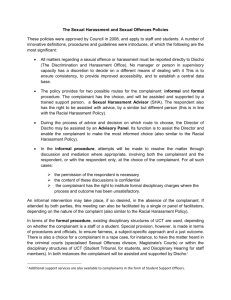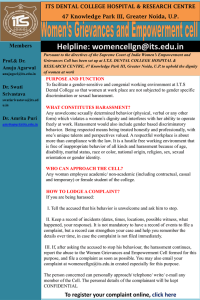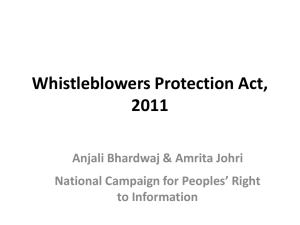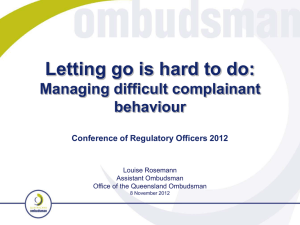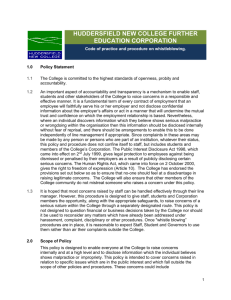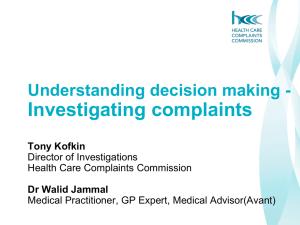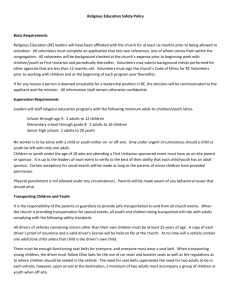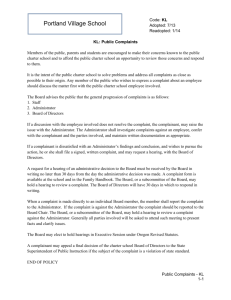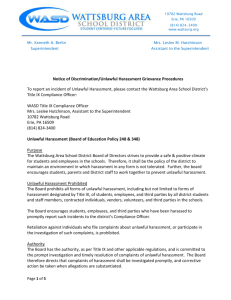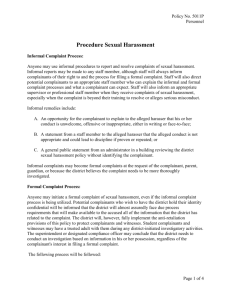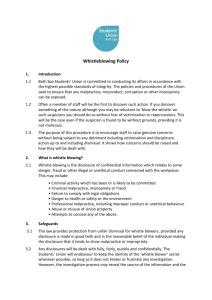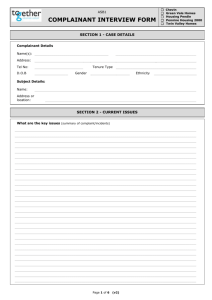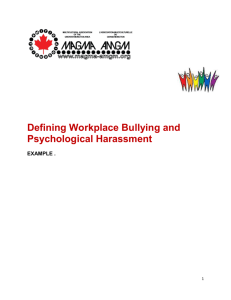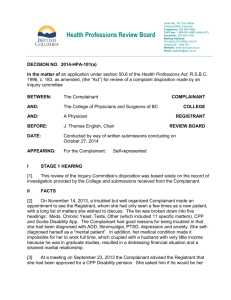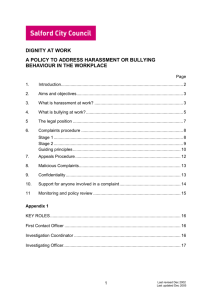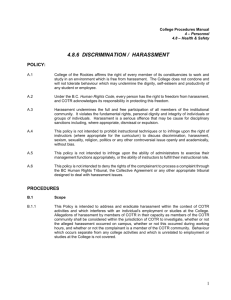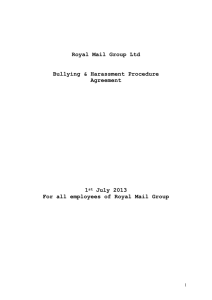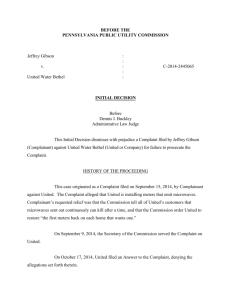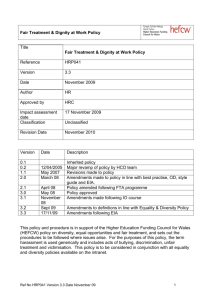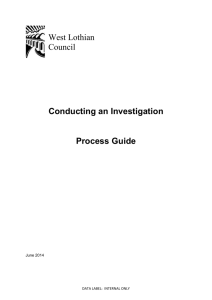Dignity at Work Procedure - Dodleston C of E Primary School
advertisement
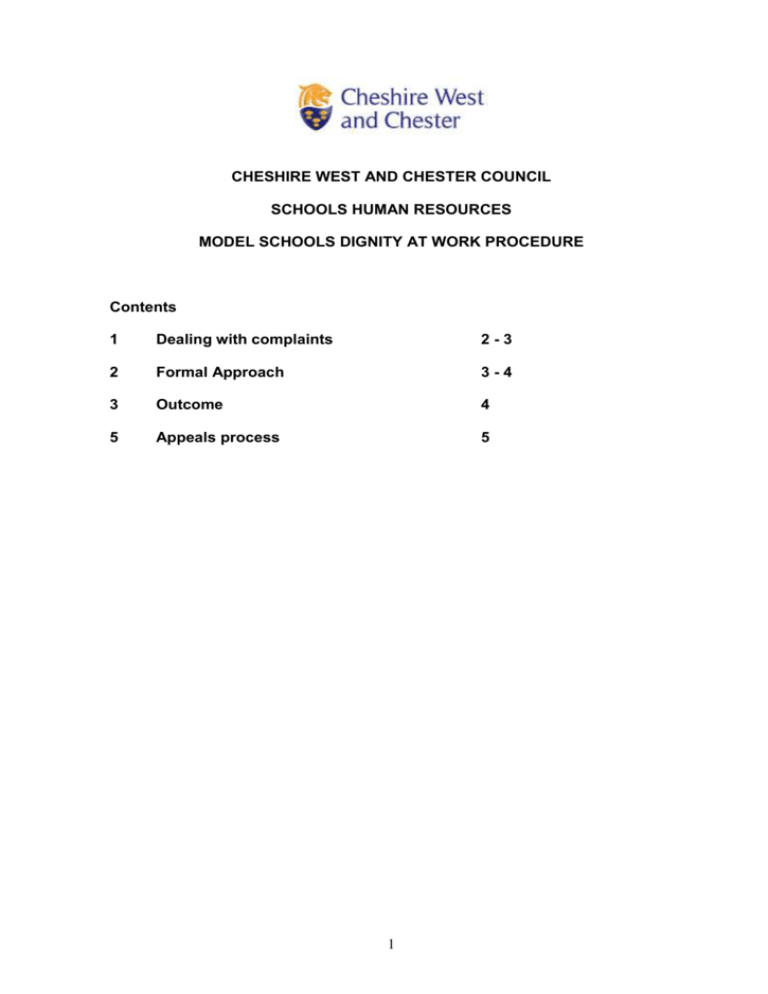
CHESHIRE WEST AND CHESTER COUNCIL SCHOOLS HUMAN RESOURCES MODEL SCHOOLS DIGNITY AT WORK PROCEDURE Contents 1 Dealing with complaints 2-3 2 Formal Approach 3-4 3 Outcome 4 5 Appeals process 5 1 1.0 Dealing with Complaints 1.1 It is important that employees who feel subjected to harassment or bullying raise the issue with an appropriate person at the time the incident(s) occur, in order that matters can be dealt with swiftly and that further potential harassment is prevented. Where the harassment involves a series of minor incidents, an employee should keep a record of the incidents including the date, time, and nature of the incident and the names of any witnesses. They should share this information when raising their concerns. 1.2 Where possible and appropriate, harassment and bullying complaints should be dealt with by using an informal approach, at least in the first instance. Informal action provides the opportunity to resolve allegations of harassment through informal discussion and mediation. Some people may not be aware that their behaviour in some circumstances is being perceived as bullying or harassment. Using an informal approach gives the alleged perpetrator the opportunity to stop. 1.3 If the employee (the Complainant) feels able, they should raise the problem with the alleged perpetrator (the Subject), either verbally or in writing, making it clear that the behaviour is offensive and unwelcome, and ask for it to stop. Alternatively the issue may be raised with a line manager who could support them informally, or raise the allegations informally on behalf of the employee. 1.4 Where a group of employees have common concerns about the behaviour of a colleague, they should report these to their line manager who will meet with the employees and consider their concerns. The manager may then make an informal approach to the alleged perpetrator to try to resolve the issue. 1.5 Where there are concerns about the behaviour of the Headteacher, these should be raised, in writing, with the Chair of Governors who will meet with the Complainant(s) and consider their concerns. The Chair of Governors may then make an informal approach to the Headteacher to try to resolve the issue. 1.6 Action to deal with concerns will involve meetings with the Complainant(s) and the Subject. These may be individual or joint (with facilitation) at the discretion of the manager with whom the concern has been raised and taking account of the wishes of all parties. 2.0 Formal Approach 2.1 If an employee, or group of employees, wishes to make a formal complaint they should outline it in writing to their line manager. They should specifically indicate whether they believe formal action is appropriate because informal resolution has failed or because they believe the matter to be so serious as to justify a formal approach from the outset. They 2 should provide all available supporting information and detail. If the complaint involves their line manager the employee should write to the Headteacher. Where the Headteacher is the subject of the complaint, the employee should write to the Chair of Governors. 2.2 The manager will acknowledge the complaint, in writing, within 5 working days of receipt outlining the next steps of the process. 2.3 The Subject will be called to a meeting where they will be formally advised of the allegations. They will be advised of any steps that are to be put in place to protect them; the complainant and the employment relationship . Such action will be without any assumption of culpability, will always be for as short a period as possible, and the need for its continuation must be reviewed regularly. They will be advised of their right to be accompanied by a Trade Union representative or work colleague at any investigatory interview, should that be necessary. If such action is required the manager may seek to arrange for the Subject’s Trade Union representative to be present at the meeting when this is advised. These actions should have no detrimental impact on the employee. 2.4 Where there has been no attempt at informal resolution, the manager will meet with the Complainant (s) bringing the complaint to explore options for resolution. 2.5 Where a formal investigation is to be carried out, the school will appoint an Investigating Officer. A formal investigation will be carried out with due regard to the need for a swift conclusion and will normally take a maximum of 4 working weeks to complete from the date the complaint was received. If the Investigating Officer requires more time to complete the investigation then he/she will keep all parties informed of extended timescales. If a counter complaint is received from the Subject , this will be dealt with as part of the same investigation. 2.6 At any stage of the formal procedure the Complainant may decide that they wish to resolve the situation informally. Where possible this decision will be supported but if the Investigating Officer feels that this is not appropriate given the seriousness of the allegations or there is perceived to be any risk to the complainant then he/she should continue with the formal action. 2.7 The Investigating Officer will interview the Complainant and the Subject and prepare notes of those meetings for signature. Both parties have a right to be accompanied by either an accredited Trade Union representative or work colleague at any interview and to submit any written evidence pertinent to the investigation. The Investigating Officer may also interview any witnesses to the alleged harassment/bullying. At the outset of the investigation, the Complainant, the Subject and/or their trade union representatives should share with the Investigating Officer the names of anyone they feel has information pertinent to the investigation. This is not limited to current employees of the school. The Investigating Officer will come to a judgement on the extent of his/her enquiries and 2.8 3 interviews taking account of the need to carry out a reasonable investigation. 2.8 On completion of the investigation the Investigating Officer will evaluate the evidence and prepare a written report to the Complainant’s Manager. Where the Headteacher is the subject of the complaint, this report will be submitted to the Chair of Governors. The written report will summarise the findings on the allegations of the Complainant and recommend what further action should be taken. 2.9 The Manager will consider the report and make it available to both employees and their representatives. They may arrange separate meetings with both parties and consider representations. They will then decide on the course of action to be taken and provide formal notification to that effect to both parties. 3.0 Outcomes - Closing an investigation will lead to three possible outcomes: 3.1 Complaint not upheld If it is decided that there is no case to answer, support will be provided for both parties and consideration given to managing their ongoing working relationship. Consideration will be given to whether there is evidence that the complaint has been malicious. 3.2 Evidence of unacceptable behaviour that may be dealt with by the usual supervisory process Where inappropriate behaviour has occurred but given all the circumstances it is not considered serious enough to warrant disciplinary action or evidence of deliberate intent to bully or harass is missing , the manager will address the situation through normal management processes and provide support to address the inappropriate behaviour including counselling, advice, and training . Additionally, the manager may issue a Management Instruction as to future conduct and will make it clear to the Subject that further similar instances may lead to disciplinary action. The Manager will also discuss with both parties and their representatives action to re-establish an appropriate working relationship between them. 3.3 Disciplinary Action Where an investigation concludes that there is evidence of unacceptable conduct beyond that described above, it will be necessary to commence disciplinary proceedings in accordance with the Schools Disciplinary Policy and Procedure. The investigation report produced under the Dignity at 4 Work Procedure will form the basis of the evidence to a disciplinary hearing, without the need for further investigation. 3.4 In each of the above, procedures for ongoing monitoring will be put in place by the responsible manager. 3.5 If there is evidence that the complaint of harassment/bullying was false or malicious then the complainant may be dealt with under the Schools Disciplinary Policy and Procedure. 4.0 Appeal Process 4.1 If either party is not satisfied with the outcome of the dignity at work investigation, they have the right of appeal against the decision made, which should be submitted in writing to the Headteacher or Chair of Governors within 10 working days of receiving written notification of the decision. The letter should clearly set out the grounds of the appeal and should be acknowledged within 5 working days of receipt. 4.2 Appeals can be heard in the following circumstances: 4.3 From the complainant when the complaint is not upheld From the complainant when usual supervisory processes are recommended From the alleged perpetrator when the outcome is usual supervisory processes Appeals will be heard by a three person Panel of the Governing Body who have not previously been involved with the case. Appeals will usually be held within four working weeks from the date of the acknowledgment letter. 5 Version Date Created Owner Final April 2013 School HR 6 Date Approved by School Staff Panel April 2013
